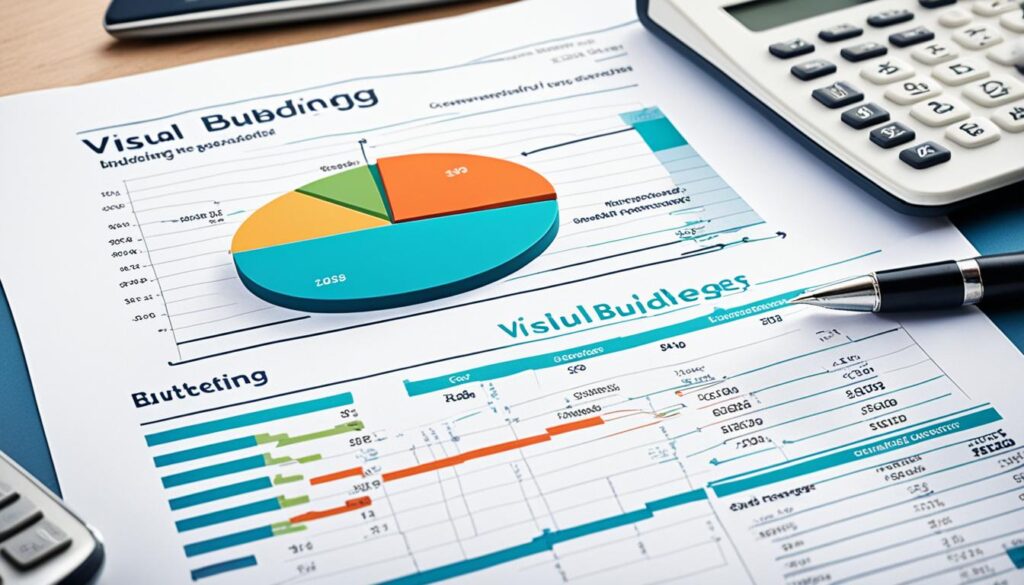Managing personal finances is like going on a journey. Budgeting is key to financial success. But there are common mistakes that can hold you back. Knowing how to dodge these mistakes is crucial for financial freedom and stability. It helps us avoid traps and lets our financial plans grow without obstacles.
Every financial mistake is a chance to learn and improve. With the right mindset and tools, you can change your financial story. It can go from being limited to having endless opportunities.

Key Takeaways
- Understanding the most frequent budgeting blunders can bolster your financial acuity.
- How to avoid budgeting mistakes is not merely about knowledge but also about application and consistency.
- Each financial planning mistake carries a lesson, turning pitfalls into stepping stones.
- Attuning to the patterns of past mishaps gives rise to more robust and adaptable budgeting strategies.
- Adopting resilient financial habits is paramount in crafting a secure and prosperous future.
Understanding and Avoiding Budget Failure Reasons
Creating a budget is just the first step toward managing money well. Yet, many people struggle because of common budgeting pitfalls. To avoid these mistakes, it’s crucial to know what typically goes wrong. This knowledge can help us avoid the traps that trip up many on the journey to financial health.
Common Reasons for Budgeting Failure
A big cause of budget failure is not having a clear plan. Without specific goals and a full view of your finances, your budget might fail. Also, not planning for unexpected costs can ruin even the best plans. These are common budgeting mistakes many people make.
Not keeping track of spending is another big mistake. Just making a budget isn’t enough. You need to watch your spending to make sure you’re not going over in any area. Not doing this can break your financial plans. It’s also easy to overestimate how much you can spend, which leads to trouble.
Forgetting to plan for things like yearly fees or car repairs can mess up your budget. These costs don’t come every month, but when they do, they hit hard. It’s important to think ahead and be ready for these expenses.
Not having an emergency fund is a classic mistake. This fund helps cover unexpected costs and keeps you safe financially. Not saving for emergencies can turn a small problem into a huge one. Being prepared for these surprises is key to keeping your budget on track.
- Lack of a defined financial plan
- Insufficient adjustment for unforeseen expenses
- Improper expenditure tracking and categorization
- Underestimating irregular or non-monthly costs
- Inadequate emergency fund preparations
To have a successful budget, you need to keep tweaking it. Your financial plan should adjust as your life and the world change. Having foresight, being flexible, and staying informed can protect you from budget failure reasons. This way, you can reach financial stability and growth.
Navigating Financial Planning Missteps with a Written Budget
Avoiding mistakes in financial planning is important for reaching your money goals. A written budget is a key way to do this. It lets you control your spending, saving, and investing. This makes sure you’re on track with your long-term goals.
Benefits of a Visual Representation of Your Budget
A written budget is even more useful when you can see it. Visuals make complex financial details easier to understand. They also make it simpler to act.
Seeing your budget helps highlight where you can save money. It also shows where you might improve savings. Overall, it means more clarity, better tracking, and a stronger drive to meet your financial goals.

Tools for Creating and Maintaining a Written Budget Plan
There are many tools to help you with your budget. You can choose between templates or apps, depending on what fits your habits.
- Budget Templates: They provide a structure for your budget. With ready-made categories and formulas, they make planning easier and more accurate.
- Budgeting Apps: These apps let you handle your budget on your phone. They can link to your bank accounts to update and categorize transactions automatically.
Here is a table that shows some popular tools and what they offer to help you decide:
| Tool Category | Examples | Key Features |
|---|---|---|
| Budget Templates | Microsoft Excel, Google Sheets | Customizable categories, formulas for automatic calculations |
| Budgeting Apps | Mint, You Need A Budget (YNAB) | Real-time tracking, reminders, goal setting |
| Visual Budgeting Tools | Tiller Money, PocketGuard | Visual dashboards, graphs, subscription monitoring |
Starting with a written budget is the most important step. Putting your budget on paper or using an app can help. The key is to make budgeting a regular habit. This will help you avoid financial mistakes and take charge of your money.
Tracking Your Spending Habits for Budget Accuracy
Keeping your finances healthy starts with tracking spending habits. It’s key to monitor expenses daily to see your financial picture clearly. Regularly logging your spending helps avoid mistakes and makes your financial reviews more insightful.
![]()
Different expense tracking methods exist, from pen and paper to advanced digital tools. Pick a system that fits your life. It should help you see where your money is going. Your main aim should be to classify every spending. This helps decide where to cut back and set spending limits.
Methods to Categorize and Monitor Daily Expenses
Breaking down expenses into categories is vital. It makes understanding your spending easier. Categories like groceries, utilities, and transport show you where money goes. This helps you make better decisions about your daily spending habits.
To keep track of your spending, here’s what you can do:
- Look over receipts and bank statements regularly, either daily or weekly.
- Put each expense into a specific category.
- Use apps or spreadsheets to make tracking easier.
- Analyze your spending by category to spot any unusual patterns.
Importance of Regular Financial Reviews
Regular financial reviews are crucial for keeping your budget on track. These reviews go deeper than just checking your bank account. They check if your spending matches your budget and goals.
Budget check-ins help fix small issues before they turn into big problems. Checking your spending often leads to better financial decisions. Connect these reviews with important life events for the best results.
By focusing on the details when tracking and monitoring your spending, you strengthen your financial health and gain freedom.
Setting Realistic Budgeting Goals to Keep You Motivated
Starting a financial journey needs clear and realistic financial goals. These should match your life plans and be achievable. Setting budgeting goals helps guide you through ups and downs with money.
Staying motivated with budgeting means connecting with your success vision. It involves breaking big dreams into smaller, achievable steps. Each goal is a step towards financial security.

- Assess your current financial situation to set a baseline.
- Delineate your short-term and long-term financial aspirations.
- Break these objectives into actionable and quantifiable goals.
- Utilize budgeting tools for consistent tracking and adjustment.
- Celebrate achievements to maintain enthusiasm and focus.
Beginning to set goals is just the first step. The table below shows how to match goals with real situations. This ensures they’re realistic:
| Goal Type | Realistic Financial Goals | Action Plan | Motivation Strategy |
|---|---|---|---|
| Short-Term | Create an emergency savings fund. | Set aside 5% of every paycheck. | Visual reminder of potential emergencies. |
| Mid-Term | Eliminate credit card debt. | Implement a debt snowball or avalanche technique. | Reward for each card paid off. |
| Long-Term | Save for retirement. | Maximize employer 401(k) contributions. | Chart progress towards retirement freedom. |
As you start this financial journey, remember that staying motivated with budgeting takes patience and commitment. Adjust your plans as needed. Each goal reached not only marks a success but also prepares you for the next money management step.
Adjusting Your Budget for One-Time and Emergency Expenses
A good financial plan includes tracking regular money flows. It also involves adjusting budget for one-time expenses and growing emergency funds. This prepares you for irregular costs like surprise car repairs or sudden medical bills. Unexpected expenses can upset even the best budgets.
Planning for budgeting for one-time costs softens the impact of these expenses. It keeps you on track with your financial goals. Understanding emergency savings and saving for emergencies is vital. We will explore how to manage one-time expenses and make an emergency fund with strong emergency fund guidelines.
Mapping Out Irregular Costs in Your Budget Calendar
It’s key to map out irregular costs in your budget calendar. Writing down anticipated irregular expenses, like yearly subscriptions or insurance payments, helps you be ready. This way, you’re not caught off guard and have money set aside.

Look at your last year’s spending to spot recurring one-time expenses. Maybe you bought a major appliance last year. You could save a bit each month for future repairs or replacements. This spreads out the cost and includes it in your monthly budget plan.
Setting Aside Emergency Funds: How Much Should You Save
When it comes to emergency funds, a big question is: How much should you save? The general advice is to keep three to six months’ worth of expenses saved. But, the ideal amount depends on your lifestyle, monthly costs, and how stable your income is.
- Create a dedicated savings account for your emergency fund. This keeps it separate from day-to-day money.
- Automate savings by having part of your paycheck go directly to the emergency savings account.
- Check and adjust your emergency fund savings as your financial situation changes.
The point of an emergency fund is to give you peace of mind and support during unexpected expenses. Follow emergency fund guidelines suited to your financial situation. This ensures you’re well-prepared for life’s surprises.
Incorporating Fun into Your Financial Planning Without Overspending
Some people think that budgeting for fun is a contradiction. But, it’s essential for enjoying financial planning. A good budget includes money for leisure since mental health and happiness are as important as being careful with money. Let’s explore how to balance fun and finances with budget-friendly activities that keep your financial goals on track.

Finding joy doesn’t mean spending on big trips or luxury shopping. It’s about setting aside part of your budget for hobbies and outings that make you happy. This practice encourages you to stick to your financial plan. It ensures that you live a satisfying life without too much sacrifice.
Remember, the objective is to live your life without constant worry about finances, and budgeting for worthwhile experiences is key to achieving this balance.
Consider these ideas:
- Host a potluck dinner with friends instead of going to an expensive restaurant.
- Attend free community events, like concerts in the park or art exhibitions.
- Watch for special offers on activities you love and plan ahead.
- Turn daily routines into fun projects, like a home decoration challenge.
It’s important to also enjoy the outcomes of disciplined financial planning. Here’s a suggestion list for your budget allocation to help you start:
| Expense Category | Allocation | Ideas for Fun |
|---|---|---|
| Entertainment | 5-10% | Streaming services, movie tickets |
| Hobbies | 3-5% | Art supplies, sporting equipment |
| Eating Out | 5-10% | Casual dining, food festivals |
| Miscellaneous | 2-5% | Books, puzzles, board games |
In conclusion, see budgeting not just as limits but as a guide to financial wellness and a great life. Start enjoying financial planning as a key part of living. Allocate funds for fun. Remember, a rich life is about experiences, not just your bank balance.
Realigning Your Expectations When Facing Budgeting Errors
Budgeting mistakes can sometimes lead to feeling upset and negative. Yet, if we change our thinking about budgeting, we can come out stronger. By realigning budgeting expectations, stress can turn into chances for growth and improvement.
Turning Budgeting into an Enjoyable Task
Many people think budgeting can’t be fun. But this isn’t true. Making budgeting fun is possible by looking at it creatively. Imagine finance management as a game. Saving more money means scoring higher. This mindset makes budgeting enjoyable and something to anticipate.
Utilizing Peer Experiences and Apps for Effective Budgeting
Peer support in budgeting is very beneficial. Sharing both your goals and errors with friends can provide motivation. At the same time, budgeting apps can make the task much simpler. This way, you can choose wisely and easily. Combining real-life stories with app features can result in community-based budgeting. This approach blends collective insights with cutting-edge technology.
Here’s a look at some top budgeting apps that assist in budgeting:
| App Name | Features | User Rating |
|---|---|---|
| Mint | Expense tracking, budgeting, bill reminders | 4.5 Stars |
| You Need a Budget (YNAB) | Detailed budgeting framework, real-time access to finances | 4.7 Stars |
| PocketGuard | Spending limits, goal setting, subscription management | 4.3 Stars |
In the end, dealing with budget mistakes means changing how we approach them. Finding joy in budgeting and using technology and friends can simplify and enrich our financial lives.

Effective Strategies to Curb Overspending and Reduce Expenses
Cutting costs can seem hard, but it’s easier with the right tips. Using smart budgeting techniques can help you spend less and save more. These strategies are easy to include in your daily life, and they work.

First, know where your money goes. Tracking spending can show you where you’re using money unwisely. This could be eating out too much or buying things on a whim. You can use an app or a spreadsheet to watch your spending daily.
- Identify non-essential items you can live without or reduce in frequency.
- Shop with a list to avoid unneeded purchases and stick to your prepared budget.
- Adopt the practice of waiting 24-48 hours before making larger purchases to avoid impulse buying.
It’s also smart to look at monthly subscriptions. Many of us pay for things like streaming services or gym memberships we hardly use.
| Expense Category | Average Monthly Cost | Potential Savings |
|---|---|---|
| Streaming Services | $40 | $20 (by choosing one) |
| Gym Memberships | $60 | $60 (if unused) |
| Subscription Boxes | $30 | $30 (opt for bi-monthly) |
Meal planning is another great way to stop overspending on food. Plan your meals and cook at home to save money and eat better.
“By cooking at home and meal prepping, I’ve saved almost half of what I used to spend on takeout every month,” shares a savvy saver from a recent budgeting workshop.
Doing projects yourself can also help you spend less. Learning simple skills like sewing or painting can save you a lot of money. You don’t always need to hire someone for home repairs or crafts.
- Attend community classes or watch tutorials for basic home maintenance and improvements.
- Plan a ‘skill-swap’ with friends where you trade your abilities with each other instead of spending money.
These steps make budgeting feel less like rules and more like powerful choices for your finances. The aim is to make small changes that add up to big savings. By following these strategies, reaching your financial goals is possible.
Owning and Correcting Common Budgeting Mistakes
Admitting we’ve made mistakes with money is a crucial first step. It’s key to making real progress. By owning up to our budgeting errors, we can see where we went wrong.
This allows us to fix these mistakes. Effective financial management means checking our spending and savings often. We must make sure we’re adjusting our budget as life changes.
Identifying the Root Causes of Budget Failures
Analyzing our budgeting errors is critical before we make changes. We need to understand the financial mistakes we’ve made. This involves looking closely at past choices.
Did we spend too optimistically? Or underestimate our regular bills? A deep dive into these questions helps us avoid past mistakes in our future budget plans.
Approaches for Realistic and Flexible Budgeting Adjustments
To manage our money well, we need flexibility in our budgeting. This means fixing mistakes fast and changing our methods when needed. Making realistic changes might mean saving for emergencies, updating our savings goals, or changing how much we spend based on our current income and lifestyle.
With these flexible adjustments, we prepare for unexpected life events. This makes our financial plans strong and adaptable to any situation.